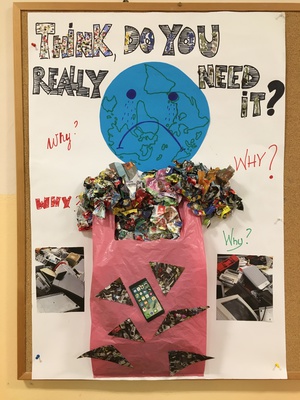A scenario about responsible consumption
1. What does responsible consumption mean? - discussion with students from the project. Children's ideas, examples given by adults.
2. Homework to do - watch, listen, save - various examples of ads about responsible consumption - tv, radio, internet, newspapers, advertising banners, leaflets, other. Bring examples to school. Share with others on platforms like paddled or other.
3. Workshop: Making posters (collage) - examples of responsible consumption. Encouragement to use a variety of techniques and be creative.
4. Exhibition of posters in the school corridor.
5. Summary discussion with students after seeing the exhibition. Seeing the diversity of selected examples. Praise for commitment. Encourage responsible consumption every day.

How do the workshop:
What do we need?
To carry out the activity, only paper and pencil will be necessary.
Steps to follow
1. We should divide pupils who participate in subgroups.
Each of them is given a list with the following things:
- Own bedroom.
- Sweet.
- Education
- Nutritive food.
- Protection against discrimination.
- A T.V.
- Money to spend as you want.
- Vacation trips.
- The opportunity to express your opinion and be heard.
- Drinking water.
- Protection against abuse and neglect.
- Fashion clothes.
- A bike.
- The opportunity to practice your own religion.
- A computer.
- Medical attention when you need it.
- Clean Air.
- Public places to be with friends and play sports.
- An MP3
- A house.
Next, we will explain that this is the list of things that all the people who inhabit a small city, after an intense debate, have chosen as important to live. But later a crisis comes and they are forced to reduce the list to only 7 things, the most essential.
Each group will have to decide, in 20 or 30 minutes, with what 7 things they stay and write them down on paper.
Once the time has passed, each group counts their 7 things and they are written on a blackboard or sheet of paper.
If the lists of the different groups do not match, a debate opens on those things where there are no coincidences.
To help the debate, questions such as the following can be launched:
- What items on the list were wishes and which needs? What is the difference between desires and needs?
- Do desires and needs differ from one person to another? And from one society to another? Why or why not?
- Do we consume according to needs or wishes?
- Do we consume all of them equally?
Workshop.docx